The Gift of South Dakota
Subscriptions to South Dakota Magazine make great gifts!
Subscribe today — 1 year (6 issues) is just $29!
Under the Capitol Dome
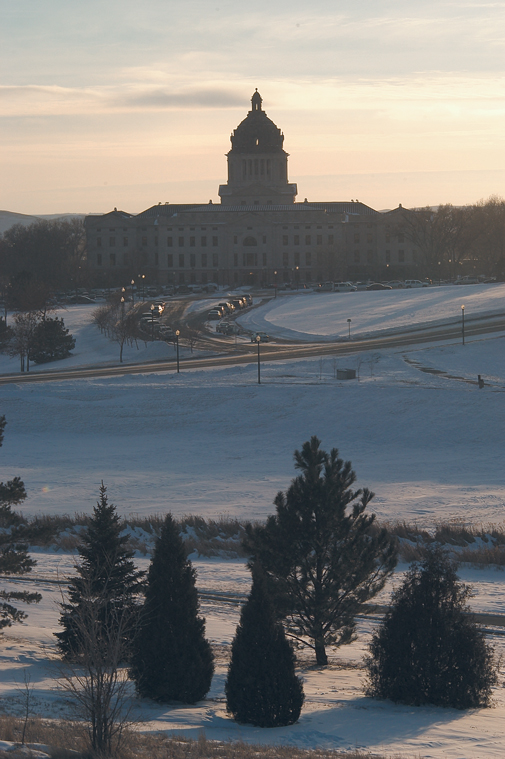 |
| The state Capitol in Pierre on a cold winter's afternoon creates a quiet atmosphere contrary to the buzz of activity within its halls. |
I had promised myself that if I won election to the state Senate, at least once every day during the legislative session, I would climb the grand staircase to the third floor of the state Capitol. Made of white Vermont marble, it glows and shimmers as if made of lead crystal. Almost as inspiring as the Milky Way, it is a staircase meant for governors, for kings, for democrats. One must breathe in and bow in such grandeur, in reverence to the grand experiment of democracy, in gratitude for the opportunity to be here.
Once up the staircase, take a right or a left, walk to the south, and you overlook the rotunda. It is 95 feet from the floor to the vaulted dome. I crane my neck, peering as deeply as I can into the arch above. Does it represent the curvature of the Earth, I wonder? Is it the heavens? Or is it the domed sky capturing the faint song of a Dakota brave to the eagle above?
The Capitol building is as much cathedral as capitol, a mountainous presence above the prairie. Early one Saturday morning in February, the moon floated across the sky like an inflated balloon, looking as if it might meld into the lighted dome of the Capitol. Then the moon, tethered to its mother Earth, sank behind the Missouri River hills, the sun rose and day began.
The capitols of Montana and South Dakota are twins. Montana and South Dakota were both admitted to the Union in 1889. Montana designed its capitol first. South Dakota Gov. Samuel Elrod, a noted skinflint, or perhaps a practical South Dakotan, didn't want to waste good money on design. He paid the Montana governor $20 for their plans.
Walk into our Capitol during the legislative session, and you enter a dynamo. The building throbs with energy, a power plant with the hum of a turbine at your feet, the strength of a South Dakota thunderstorm. As a legislator, you walk within the storm, often through its eye. You brace yourself against its ferocity and look for the lightning bolt.
I love to stand on the balcony outside the Senate Chambers, near the marble railings overlooking the rotunda. It is sufficiently high to induce vertigo. People below scurry like New York taxicabs, up and down, in and out. Surely, I thought, someone has put this to music. A lobbyist told me she used to pose herself here, like a watchtower. From this perspective, she could see who was walking below and calculate her strategy.
Watching scurrying mortals from the third floor balcony is mesmerizing, but more inspiring is to gaze at the immortals above, Greek goddesses gazing down from murals in the dome — Minerva, the goddess of wisdom and victory, Venus at play with Cupid, Ceres, and Europa, grasping a bull by its horns.
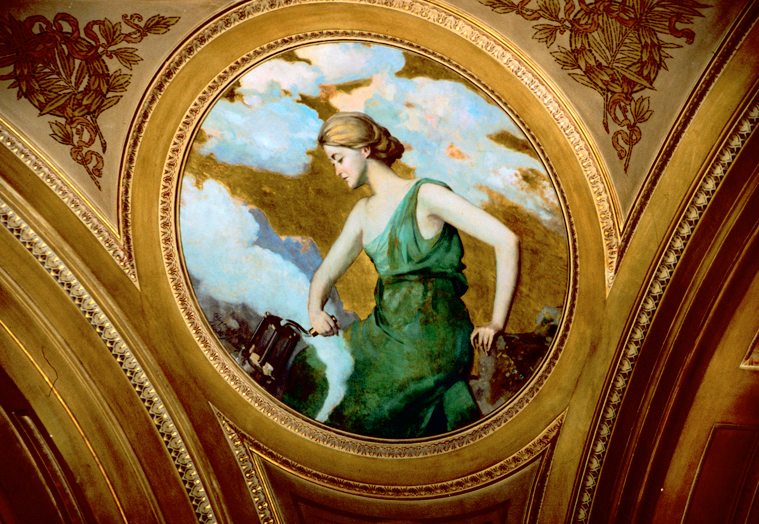 |
| Greek goddess Minerva keeps watch on legislators below. She is one of several mythic figures depicted on murals throughout the Capitol dome. |
In Greek mythology, Minerva carries an owl on her shoulder. But she also breathed life into Pandora, who unleashed the Miseries of Scolding, Deceit, Despair, Accusation, Lies, Envy, Distrust, Scheming, Drudgery and Gossip. "Here?" I thought.
The beautiful mortal, Europa, is mounting Zeus, a god disguised as a bull. Seduced by his soft eyes, she will be kidnapped and carried across the seas.
Cupid swirls in the gown of Venus, the goddess of beauty. "Cupid slinging arrows in this building?" I wondered. Unseen is the spirit of Strife, who threw the apple of discord into a wedding party, declaring, "The fairest shall pick it up." Three ravishing goddesses, Hera, Venus, and Minerva dove for the apple, and it was from this seed that the Trojan War was born.
Ceres stands alone by a cornstalk. It is she who lent her chariot to man and taught him to sow and reap. But ironically, Ceres' daughter Persephone was carried off to Hades by a dark chariot drawn by black horses. With Persephone pulled into the darkness below, the Earth grieves, and Ceres becomes an old gray woman. Winter falls, and mortals await Persephone's return in the spring, when the Earth again will bloom.
"Ah," I thought, feeling intensely mortal and vulnerable, "which goddess will have this day?"
I took a drink from the marble fountain, and walked through the swinging doors into the Senate Chamber. Woven into the carpet is the state seal with its plowman, mines, cattle, commerce, the Black Hills, the Missouri River. I could almost feel my grandmother's presence, a homesteader where the Cheyenne River meets the Missouri 40 miles up. I walk to my desk in a room of cherry wood, African mahogany and scagliola columns, where delicious paintings speak the dreams of our ancestors, where amber stained glass bathes the chambers in the light of early fall. It is regal, rich, somber, and important.
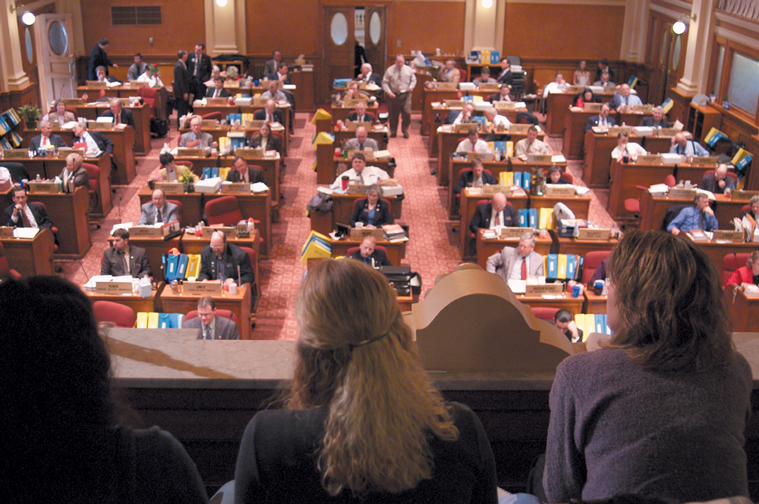 |
| Students and other constituents from around the state travel to Pierre during the legislative session to watch and learn. They observe proceedings from balconies in the Senate and House. |
My greatest surprise was a good surprise. Legislators, Republican and Democrat, are comrades. There are 35 of us in the Senate, twice that in the House. We share a responsibility, a sense of mission, a duty. Most of us are separated from home, from children and spouses. During the session, each camps in a motel or hotel room. Each is there to make a difference. For January, February and part of March, life barely exists outside the legislature.
We do battle, experience victory, suffer wounds. It is a boot camp of sorts. But through it all, as we gather in committee hearings, debate in our caucuses and argue on the floor, there is a touching of hands, an acknowledgement in the voice that says "Good morning, senator," a shared deference, a respect for the person and the position. It is not perfect, and not shared equally by all. But I have not met one former legislator who does not consider having served in the legislature as fundamental to who they are. It is a mark, a fraternity.
A cynic told me the day I left for my first session, "Don't forget, Tom. Ninety-nine percent of the people don't know and don't care what you do in Pierre." Unnecessarily harsh, I felt, but I discovered that even if he was right, the 1 percent who do care, care a great deal.
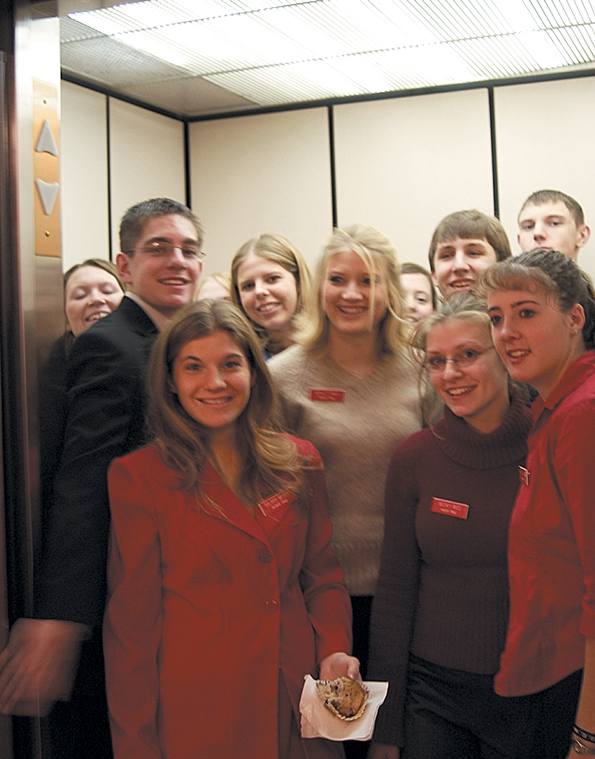 |
| Pages help the legislative process run smoothly. They are selected from high schools across South Dakota. |
"I love the process," is a common refrain among legislators. Bills start as ideas, but harden to steel, fired by the legislative process. Propose a bill, and if it is a good one, like a piece of clay it is molded and shaped by many hands. Even an argument or bill lost can move the ball, can in some way shape tomorrow's bill. I look to the panels of bearded legislators before me, I look to lawmakers unlike me, I look to lobbyists around me for perspective, for understanding. And then, somehow, through this great sifting and contemplative process, I vote, we vote. It is a process that boils down all arguments, bulging notebooks and stuffed files into one of two words: Yea, or Nay.
Another surprise. I had expected, had been told that there would be someone in leadership, in the administration, among constituents who would tell me how they expected me to vote. Not true, I discovered. But what you are expected to do is to formulate opinions that are grounded and sound, that have depth, that are representative of who you are. They may be dramatically different than people want. But if you treat serious matters seriously and thoughtfully, if you know and tell the truth to the best of your ability, you are granted the opportunity to do what you feel you have to do. And it is not possible to hide.
I had not suspected what happened to a freshman senator on his first speech on the floor. Standing amidst the roll top desks under the amber and brown stained glass of the Senate floor is not only humbling. It is frightening. When I stood to present my first bill, I gasped, then grasped for my microphone. I felt as if I was falling down a flight of stairs. But somehow I heard myself still talking, my presentation lasting all of 60 seconds or so. I sat down and did my best not to let anyone see the blood escaping my ears, mouth or nose. The bill was a lay-up, and was given to me because it was. But to my astonishment, I heard the majority leader ask the president of the Senate for permission to ask Sen. Dempster a question about his bill. As is protocol, the presiding officer, the lieutenant governor, turned to me and said, "Senator Dempster, do you wish to respond to the senator's question?"
"What?" I thought everybody knew this was my first bill. I rose again, grasped the microphone and did my best to answer the question. Then there was another, and another, the questions more direct, my answers weaker and paler. My legislative career was doomed. Mercifully, the vote was called, the roll call taken, and the bill passed. Only then did I hear Sen. Bogue welcome me to the Senate floor, followed by smiles and applause of every colleague. Sen. Sam Nachtigal walked over and slipped me a note. "Good job," it said, "but your zipper was down."
My first real bill was intensely instructive. The merits were so clear. I was surprised by the heated debate on the Senate floor, and a little offended when a member of my party rose to call it the "stupidest bill of this session." But that didn't bother me because it was just one vote. It was only when heavies in the back of the room stood and spoke against my bill that I realized I was dying. Debate ended and the votes were taken, each nay deepening my color and agony. When the dismal result was announced, Sen. Richard Kelly, seated in front of me, turned and told me to "move for a reconsideration."
When the bill came up the next day, the battle was on again. But I had asked for help, and I got it. I will never forget the assistant majority leader running up to me. "Give the rebuttal, make it short," he said. "I'll call the question." We passed the bill, and later in the session it passed the House and was signed into law.
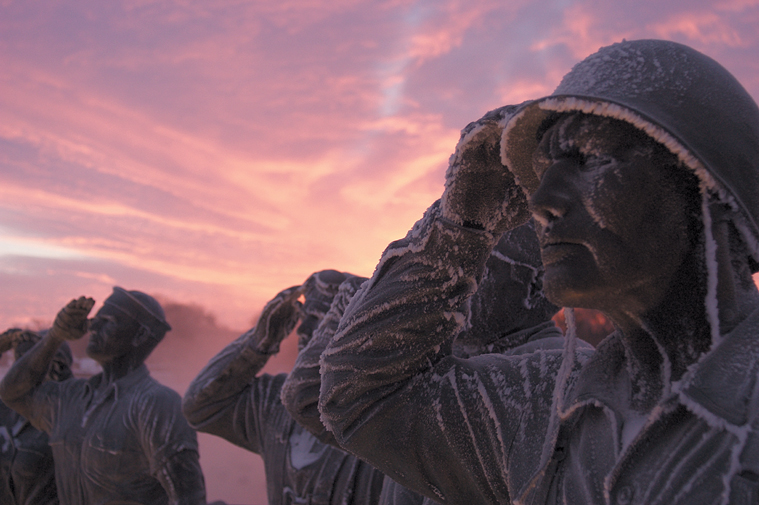 |
| The Capitol grounds includes several memorials, including this one to veterans. |
Like all specialized work, the legislature has its own language and meaning. Bills get "hog housed," and I learned that "no recommendation" from a committee is better than having a bill "sent to the 41st day." Committee action can be gutted with a "smoke-out." There is a certain window when you can submit legislation, and a specific number of bills one can sponsor as the window begins to close. Some insurance bills are filled with such complicated language that even if you hold them to a mirror and read them backwards, it doesn't help. Knowledge is king in this world, but so too is a word of encouragement, a thank you and a handshake.
Whether farmer, lawyer, teacher, rancher, doctor or stockbroker, for all legislators the pilgrimage to Pierre can be long, sometimes treacherous. To get to the middle of the state we drive through cities, farmsteads, small towns, interstates, two-lane highways. There is ritual in traveling great distances, in traversing the state on Sunday and back again on Friday or Saturday. There is satisfaction in hearing the crack of the gavel and the call that "the Senate will come to order" on Monday, and sometimes even better is the crack and the order to adjourn on Friday.
Pierre is a place apart, and the journey to it an equalizer. When winter storms move in on Friday, they stir a sense of urgency. Time to bare yourself to an unfriendly onslaught of frigid air, winds that singe like glistening knives. The highways will be treacherous, and perhaps still on Sunday when it's time to turn around and drive back. On Sunday night, stories of the road are shared. There is communion here, for all have supped the same wine. Other lawmakers become brethren, and seatmates like family.
When the legislature is not in session, the Senate and House chambers are silent, the calm of an ocean at rest. Lights are dimmed, the floor cordoned off. It is a melancholy, silenced stadium, an unlighted stage. I miss the sergeant at arms, look for the lights to fire, want to feel the blood coursing through the marble banisters. I can taste the best bagels in the world from the cafe downstairs, see the lobbyists in their huddles, wonder about the governor's men scouting below.
I close my eyes and hear the roll call. "Abdullah, aye, Albers, aye, Apa, nay." My family's Rotary exchange student from Italy, Stefie Zanet, was a Senate page, and for months after the session, she sang the roll call vote, senator after senator, name after name. Some votes fall like an easy rain. Others are tough, filling the chamber as if each vote is rung by the somber tone of a cathedral's bell, deep and final. I remember one such vote late in the session. My seatmate, Jay Duenwald, his eyes expressive as a poet's, nodded. "This sucker's gonna pass, Tom," he said. "The sucker's gonna pass."
Editor’s Note: This story is revised from the January/February 2004 issue of South Dakota Magazine. To order a copy or to subscribe, call (800) 456-5117.






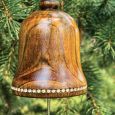


Comments